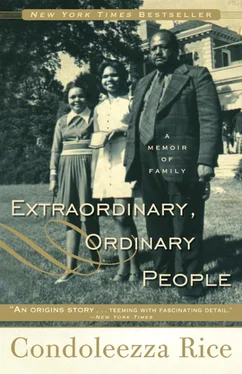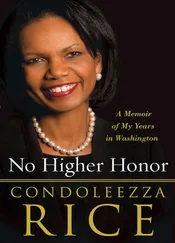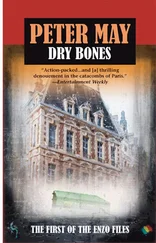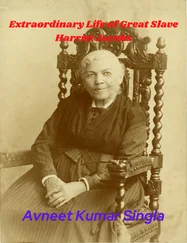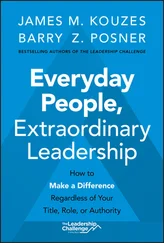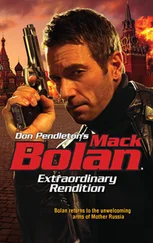“I believe the title was ‘Bin Laden Determined to Attack Inside the United States,’ ” I said. There were audible gasps in the chamber, particularly from victims’ families who were in attendance. The report’s title was suddenly the news of the hearings.
As the President’s national security advisor, I had the responsibility of managing the various agencies involved in national security affairs at the time of the attacks. It helped to remember that I’d done everything that I thought necessary at the time. From the very beginning, I pressed for a strategy to disable al Qaeda and directed Richard Clarke, the White House’s counterterrorism expert, to develop one. When threat levels began to spike in the summer of 2001, we moved the U.S. government at all levels to a high state of alert. Secretary of State Colin Powell and Secretary of Defense Donald Rumsfeld had secured our embassies and military bases abroad. After all, the intelligence assessment was that an attack would most likely come in Jordan, Saudi Arabia, Israel, or in Europe. The three of us talked almost every morning and assessed the situation and the need for further action. I asked Director of Central Intelligence George Tenet if there was more we could do, and we tried to find the key al Qaeda facilitator, Abu Zubaydah, with Vice President Dick Cheney asking the Saudis and Jordanians for help in doing so. With White House Chief of Staff Andrew Card present, I insisted that Dick Clarke inform domestic agencies of the heightened threat just in case an attack might come against the United States, despite the lack of intelligence pointing to the homeland. I did everything I could.
I was convinced of that intellectually. But, given the severity of what occurred, I clearly hadn’t done enough. The hardest moment that morning was walking into the room and seeing the families of the 9/11 victims. Some were accusatory and others were supportive, but they were all hurting. And I hurt for them because the United States of America had failed to protect nearly three thousand of its innocent citizens.
The room was filled to capacity, and there were cameras and television lights everywhere. I felt surprisingly calm and said a little prayer before we started. I made my opening statement, acknowledging that the country had been poorly prepared—but because of systemic failures, not the negligence of any one administration or any one person. There was no silver bullet that could have prevented the 9/11 attacks. I concluded my prepared testimony by making the point that terrorists have to be successful just once, while the defender must be vigilant 100 percent of the time.
I had to make the policy case for what we’d done in response, place the blame squarely on al Qaeda, recommend changes to prevent another attack, and restore the American people’s confidence in the Bush administration. A part of me wanted to apologize, but the collective view of my advisors was that to do so would overwhelm anything else that I said. So instead I expressed regret.
“I’ve asked myself a thousand times what more we could have done,” I told the commission. “I know that had we thought there was an attack coming in Washington or New York, we would have moved heaven and earth to try and stop it.”
• • •
YEARS LATER, in 2008, toward the end of our time in office, a terrorist attack took place in Mumbai, India. I traveled to New Delhi to lend support to the Indian government and to defuse tensions between India and Pakistan. I walked into Prime Minister Manmohan Singh’s living room and came face to face with the Indian national security advisor. He was a slight man who wore huge dark-rimmed glasses that made him look like an owl. I had heard that he had offered to resign shortly after the attack and that the prime minister had refused to accept his resignation. He, M. K. Narayanan, had the same shell-shocked look that I remembered seeing in the mirror after the attacks on the Twin Towers and the Pentagon.
I took his hands. “It’s not your fault,” I said. “I know how you feel. It’s like being in a dark room with doors all around and knowing anything might pop out and attack again. But now you have to concentrate on preventing the next attack.”
I don’t actually remember what he said in response because, in reality, I was very much inside myself. I was replaying those awful days in the wake of 9/11, days that had from that time forward been September 12 over and over again. Nothing was ever the same. It was as if there had been a crack in time.
Protest as you might to yourself, to the nation, and to the world, you never get over the feeling that you could have done better. And you resolve never to let it happen again.

My great-grandfather was illiterate, but my great-grandmother, Julia Head, was a favored household slave who had learned to read as a young girl.

My father at three years old and his sister, Theresa, at five, shown here with my grandparents. Daddy was an easygoing personality and a superb athlete. Theresa was reclusive but brilliant.

The son of sharecroppers, Granddaddy Rice received a scholarship to study at Stillman College after agreeing to become a Presbyterian minister. He was an “educational evangelist,” establishing local schools and impressing upon his students the importance of attending college.

My mother, Angelena (right), at three, and her sister, Mattie, at five. The cute little darlings were featured here as “calendar” girls for the local barbershop.

My maternal grandmother, Mattie Lula Parrom, had rich-brown skin and very high cheekbones, attesting to an ill-defined American Indian heritage. She is pictured here at her graduation from St. Mark’s Academy, a “finishing” school for well-to-do young black women.

After running away from home, my maternal grandfather, Albert Ray III, found himself alone in a train station one evening with just one token in his pocket. “Old Man Wheeler,” the patriarch of a white family, brought him home and raised him with his sons.

Mother (far right), her brother, Alto, and her sister, Gee (far left) were often reminded by their parents to maintain their dignity despite the degrading circumstances of segregated Birmingham. They and their cousin, Kate, are pictured here with my grandfather’s truck.

Daddy completed college and seminary at Johnson C. Smith University in North Carolina. Like his father, he would become an educational evangelist and mentor students in Birmingham, Tuscaloosa, Denver, and Palo Alto.

My mother’s students remembered her as an extraordinary beauty but also as a demanding teacher whom they obeyed despite her diminutive stature.

Here I am sitting in Mother’s lap, my little foot poking out from underneath the blanket. Had I been born a boy, my father would have named me John. But Mother got her way—a girl named Condoleezza, meaning “with sweetness.”

Mother believed passionately in the importance of the arts and organized student-led performances wherever she taught. Here, the two of us pose for the cameras after one of her productions. It was late, and I was clearly ready to go home.

I started to play the piano at three. The little organ pictured here didn’t have enough keys in the bass, so after I learned “What a Friend We Have in Jesus,” my parents found the money one day to rent a real piano. I began to play at recitals throughout the city. Here I am playing for the new teachers’ conference. I still don’t understand my mother’s decision to have me wear that fuzzy white hat.

I spent the first three years of my life living with my parents in a small apartment in the back of Westminster Presbyterian, my father’s church.

Mother and me, dressed in our swimsuits. I did not learn proper swimming techniques until I was twenty-five because Eugene “Bull” Connor closed Birmingham’s recreational facilities after the courts ordered him to integrate them.
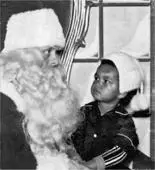
Here I am eyeing Santa Claus suspiciously. A few years later when we went to see Saint Nick, a racial incident almost broke out when my father noticed that the Santa in question was treating black and white children differently. Daddy was prepared to “pull all that stuff off him and expose him as just another cracker.” Fortunately, Santa got the body language and treated me very well.
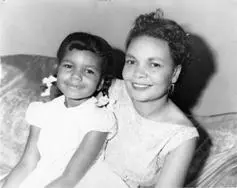
Mother filled our home with beautiful, well-preserved mahogany furniture. The sofa on which my mother and I are sitting resides in my home today.
Courtesy of Chris McNair .
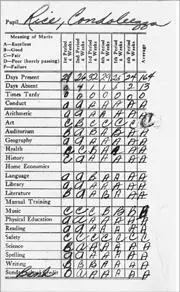
I liked but didn’t love school. I got good grades despite a tendency toward procrastination. Clearly art (notice the string of Cs) was not my strong suit.
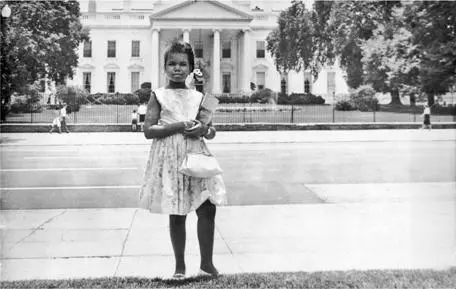
Here I am standing outside the White House during a family trip to D.C. My father said that I proclaimed, “I will work in there some day.” I don’t remember saying that, but my parents did have me convinced that even if I couldn’t have a hamburger at Woolworth’s lunch counter, I could grow up to be President of the United States.
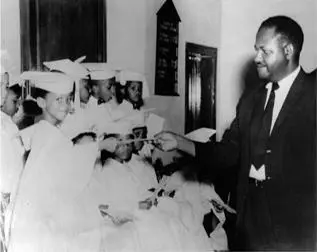
Daddy established a kindergarten program at his church. Here, at a “graduation” ceremony for his students, he is handing a diploma to Denise McNair, one of the four little girls who were killed in the Sixteenth Street Baptist Church bombing in 1963.
Courtesy of Chris McNair
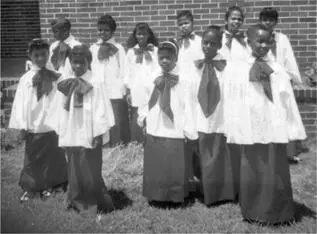
Daddy’s youth programs were renowned throughout the city. Here I am standing with members of Westminster’s children’s choir in the back row, second from the left.
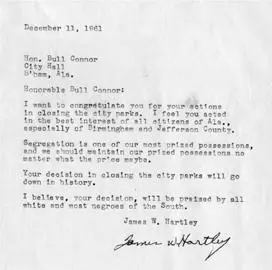
It was in 1961 that Eugene “Bull” Connor decided to close Birmingham’s recreational facilities rather than integrate them. He received wide support from whites, like the author of this letter.
Eugene “Bull” Connor Papers, Birmingham, Alabama, Public Library Archives, Cat. #268.8.12 .
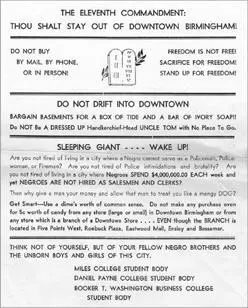
Local civil rights leaders urged black customers to boycott white merchants who did not treat them equally. I was disappointed that we had to forgo our annual Christmas shopping but was old enough to understand the larger issues at stake.
Birmingham Civil Rights Institute
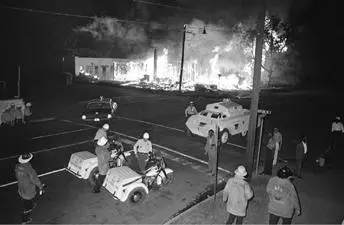
While the civil rights movement is remembered for nonviolent civil disobedience, that was not always the case. A full-scale riot erupted on May 11, 1963, with black protesters setting fire to police cars and confronting an armored personnel carrier rumored to contain Bull Connor himself. My parents and I went to survey the damage that next morning.
Associated Press
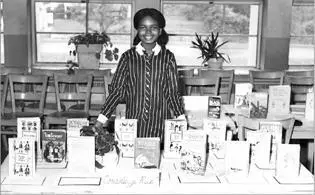
My school was selected to participate in the city’s first integrated book fair at the Tutwiler Hotel. Here I am displaying my reading project. Mrs. Green, our teacher, was very proud to say that our presentations were far superior to the “shabby” ones of the white kids.
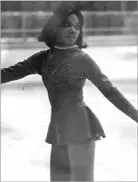
I took up figure skating while my parents pursued graduate work at the University of Denver. I was simply not very good. “It’s amazing you can do a jump,” one judge remarked. “You never actually leave the ice.”
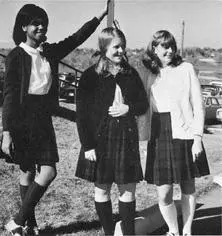
The rigorous academics at St. Mary’s Academy prepared me well for college. Life also revolved around trying to attract the boys at our brother schools, Mullen Prep and Regis High. Plaid skirts, bobby socks, and saddle shoes were part of the uniform.
Courtesy of St. Mary’s Academy, 1969–1970 Yearbook
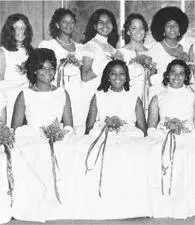
During my senior year at St. Mary’s, Daddy “presented” me (top middle) at the Owl Club cotillion, a debutante ball for accomplished black high school girls. I felt totally out of place, since I had already transitioned to being a college student, taking classes at the University of Denver.
Courtesy of the Denver Public Library, Western History Collection; photo by Burnis McCloud
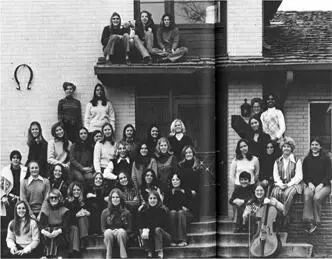
My father said that I couldn’t live in the dorm because “he knew what went on in there.” So I pledged Alpha Chi Omega. Here I am (back, right), pictured with my sisters.
Courtesy of the Archives and Special Collections, Penrose Library, University of Denver
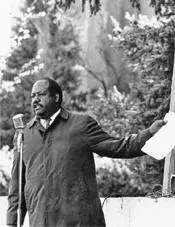
As an assistant dean at the University of Denver, Daddy was the liaison to students during the raucous Vietnam War demonstrations, such as this one on Denver’s Carnegie Field in 1971.
Courtesy of the Archives and Special Collections, Penrose Library, University of Denver
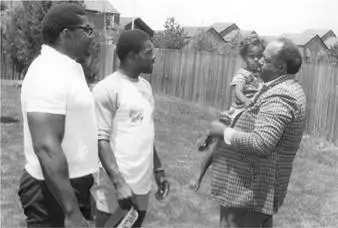
I thought I’d found the man I wanted to marry, Rick Upchurch (center), a wide receiver for the Denver Broncos. He is pictured here with Rubin Carter, the Broncos’ nose tackle, and my father, who is holding two-year-old Brian, the son of wide receiver Haven Moses and my good friend Joyce.
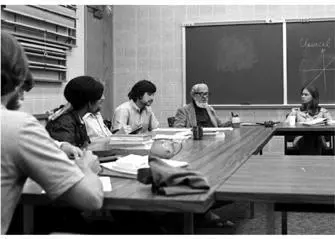
After deciding to abandon my dream of being a concert pianist, I wandered into a course in international politics taught by Josef Korbel (center). In one of those odd coincidences, the man who opened up the world of Soviet studies to me was the father of Madeleine Albright. Here I am (leaning forward) in Dr. Korbel’s “Comparative Communism” class.
Courtesy of the Archives and Special Collections, Penrose Library, University of Denver
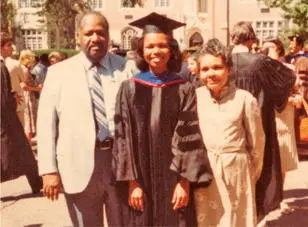
I received my PhD in August 1981 with a job offer from Stanford in hand. That morning, Daddy gave me a set of classic books that Granddaddy Rice had purchased during the Great Depression, despite his modest means. It remains one of the proudest moments of my life.
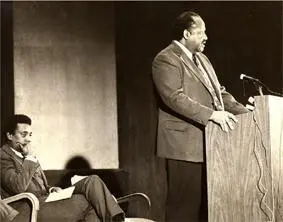
Stokely Carmichael (seated) was a regular speaker in my father’s courses and even at an adult education seminar at virtually all-white Montview Boulevard Presbyterian Church in Denver. This radical black activist was a good friend of the family.
Courtesy of the Archives and Special Collections, Penrose Library, University of Denver
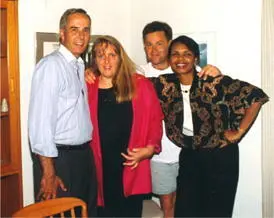
At Stanford, I developed a close circle of friends, including Randy Bean (center), Chip Blacker (left), and Louis Olave (right). My father loved Chip and Louis’s dinners, followed by music played on Louis’s amped-up stereo.
Courtesy of Chip Blacker and Louis Olave
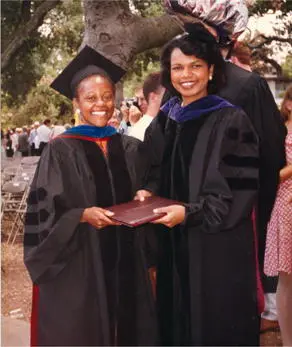
Jendayi Frazer was a sophomore in one of my first classes at Stanford and, later, my first PhD student. She would go on to become the Africa specialist at the NSC, ambassador to South Africa, and the assistant secretary for African affairs at the State Department.
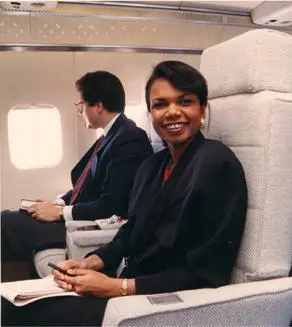
I first flew aboard Air Force One while working for President George H. W. Bush. Here is my maiden voyage in April 1989 on the way to the President’s historic speech in Hamtramck, Michigan, welcoming revolutionary events in Poland.
George Bush Presidential Library and Museum
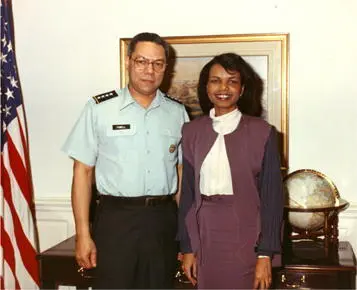
I first met Gen. Colin Powell while I was working for the Joint Chiefs of Staff at the Pentagon. He was serving as deputy national security advisor for President Reagan, and this first meeting gave rise to a friendship that I value to this day.
Office of the Joint Chiefs of Staff
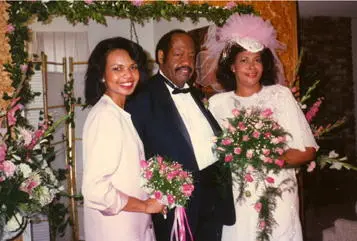
During one of our nightly phone conversations long after my mother’s death, Daddy told me he planned to remarry. His intended bride was Clara Bailey, a principal in the Ravenswood School District. I couldn’t have been happier for him, and I was thrilled to have the chance to travel back to California for the wedding.
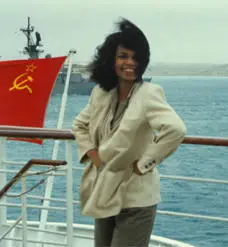
When we scheduled the Malta Summit for December 1989, we didn’t account for the weather. Here I am trying to hold on aboard the Maxim Gorky , a Soviet cruise ship.
Rice Personal Collection
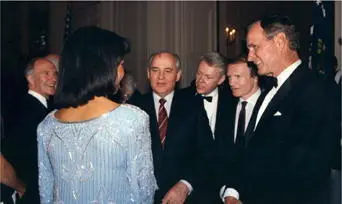
Here I am greeting Soviet leader Mikhail Gorbachev during the 1990 Washington Summit. Gorbachev was losing control of the revolution he had unleashed; the Soviet Union would cease to exist less than eighteen months after this picture was taken.
George Bush Presidential Library and Museum
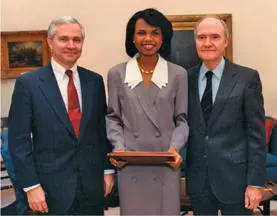
A close mentor and friend, Gen. Brent Scowcroft (right) invited me to work at the National Security Council, where he served as national security advisor to President George H. W. Bush. Here we are toward the end of my service, standing with Brent’s deputy, Bob Gates, who would later serve as secretary of defense.
George Bush Presidential Library and Museum
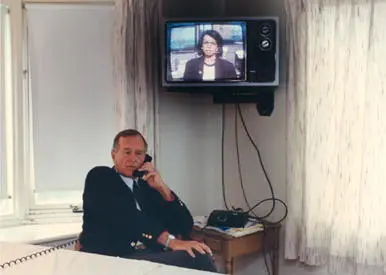
After returning to Stanford, I provided on-air commentary for ABC News about Soviet affairs. I was pleased to learn that the President, pictured here at Kennebunkport, was still interested in my advice.
George Bush Presidential Library and Museum
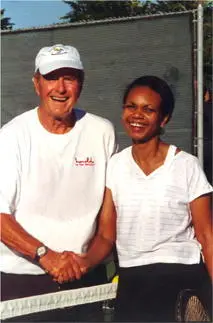
President Bush successfully led the United States and its allies through the uncharted territory of ending the Cold War. He and Mrs. Barbara Bush have been wonderful mentors and friends. Here we enjoy a common love of tennis while vacationing at his summer home in Maine.
Rice Personal Collection
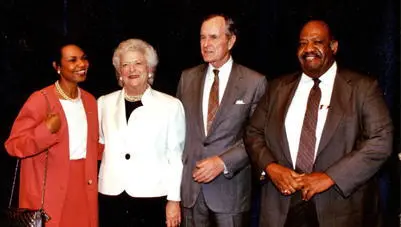
Daddy was so proud to see his daughter working for the President of the United States. Here we stand with President Bush and First Lady Barbara Bush in 1992.
George Bush Presidential Library and Museum
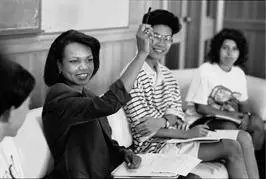
When I was Stanford’s provost, President Gerhard Casper and I led efforts to reform undergraduate education, establishing freshman and sophomore seminars. I loved teaching these small classes, such as this one on the Soviet Union.
Copyright © Linda A. Cicero/ Stanford News Service
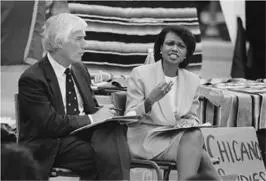
When budget cuts forced me to make difficult decisions, Chicano students set up a tent city on the Quad and staged a hunger strike. Here, Gerhard (left) and I face the students in front of our offices.
Copyright © Linda A. Cicero/ Stanford News Service
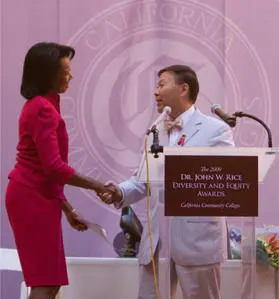
Daddy served on the Board of Governors of the California Community Colleges. Today, annual fellowships are given in his honor, a fitting tribute to his life’s work in education.
Courtesy of the Chancellor’s Office, California Community Colleges; photo by Sam Wood
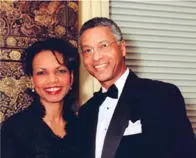
Gene Washington, best known as a former NFL wide receiver, remains one of my closest friends to this day.
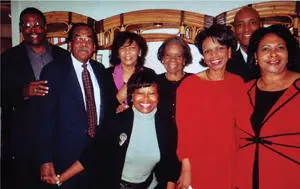
I have been blessed with a wonderful extended family, including (from left to right) Will Alston, my uncle Alto, my aunt Connie, my cousin Lativia, Aunt Gee, my stepbrother, Greg, and my stepmother, Clara.
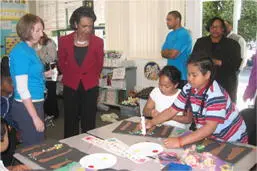
In 1992, Susan Ford Dorsey and I tapped several other community leaders and launched an after-school enrichment program for disadvantaged children in nearby East Palo Alto. We called it the Center for a New Generation, and it thrives today as a part of the Boys and Girls Clubs of America.
Courtesy of the Boys and Girls Club of the Peninsula
Читать дальше
